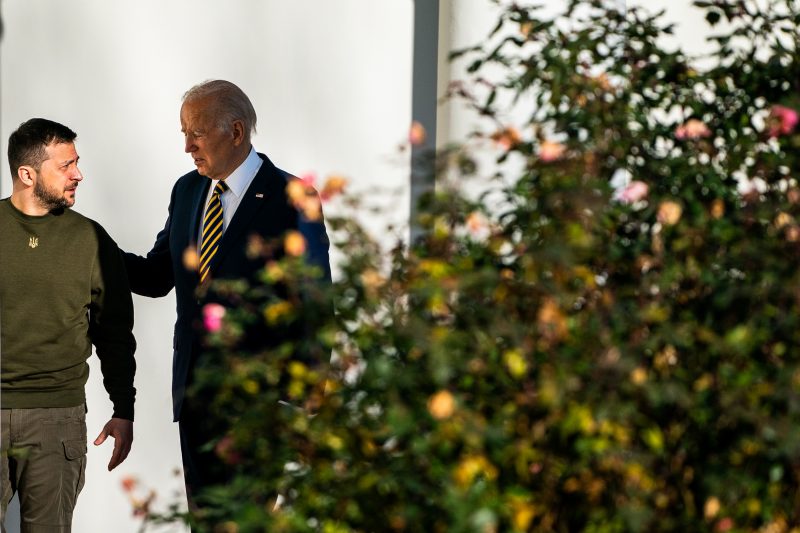Sixteen months before President Biden moved Friday to send cluster munitions to help Ukraine in the fight against Russia, his ambassador to the United Nations offered some choice words about such weapons.
“We have seen videos of Russian forces moving exceptionally lethal weaponry into Ukraine, which has no place on the battlefield,” Linda Greenfield-Thomas told the U.N. General Assembly in March 2022. “That includes cluster munitions and vacuum bombs, which are banned under the Geneva Convention.”
Within two days, the State Department crossed out the line about how such weapons had “no place on the battlefield” from its official transcript. It also added an asterisk, qualifying that the Geneva Conventions ban the use of cluster munitions only against civilians.
The pullback from Thomas-Greenfield’s initial remarks was prescient, with Biden now ready to provide Ukraine the powerful but fraught weapon.
Many U.S. allies have sworn off the weapons under the Convention on Cluster Munitions. (The United States and Ukraine are not party to the convention, nor are about one-fourth of NATO countries.) The major issue with them is that the weapons can leave unexploded submunitions on the ground long after a conflict, endangering friendly troops and civilians. The Washington Post reports that Biden will bypass a U.S. law prohibiting cluster munitions with a failure rate of more than 1 percent.
This shift is the latest example of Biden — who was a longtime foreign policy-focused senator — wrestling with the issue. And he has long been more willing to entertain the use of such weapons than some of his Democratic colleagues.
Shortly before Biden became vice president in the 2008 election, some Senate Democrats pushed to rein in cluster munitions. They wanted to limit the ones sent to other countries to those with low failure — or “dud” — rates and to prevent their use in populated areas.
Biden initially voiced support for the thrust of the effort to pull back, but he raised concerns about the impact of such a move, citing how cluster munitions are “very useful militarily.” He called for hearings.
“This is a legitimate issue to consider and, perhaps, to legislate,” he said in 2006. “But it should be done in a careful manner, after holding hearings and with proper preparation.”
By that fall, two Senate Democrats had introduced an amendment to bar the use of cluster munitions in populated areas, over objections from the George W. Bush administration. Biden was among 15 Democrats who opposed the amendment, along with then-Sen. Hillary Clinton (N.Y.). (Then-Sen. Barack Obama (Ill.) supported it.)
The issue at the time had been rekindled by Israel’s use of old U.S.-made cluster munitions against Hezbollah in Lebanon. Many opponents of the effort to bar the weapons were worried that such a move would be viewed as a rebuke of a key U.S. ally.
The backdrop was similar to the one in the early 1980s, when Sen. Biden and others confronted ethical questions about cluster munitions. Amid reports that Israel had used cluster bombs in its invasion of Lebanon, some Democrats went so far as to push for cutting off aid to Israel.
According to a contemporary UPI report, Biden said that if those reports were accurate, then Israel was clearly in violation. He said the United States should respond by “cutting off the ability to get access to that kind of weaponry in the future.” But he cautioned against making a “final judgment” and again called for hearings on the subject.
Democrats also expressed such concerns during what the New York Times labeled “a highly emotional confrontation” on Capitol Hill with Israeli Prime Minister Menachem Begin in June 1982. Sen. Paul Tsongas (D-Mass.) highlighted the cluster bomb reports while saying he had “never seen such an angry session with a foreign head of state.”
The Times recounted the “bitterest exchange” as taking place between Begin and Biden. But Biden reportedly objected not to the nature of the military tactics but rather to Israel’s policy of establishing new Jewish settlements in the West Bank. When Begin returned to Jerusalem and spoke with reporters, he suggested Biden actually expressed support for even more extensive military measures.
Begin did not name Biden — citing only a “young senator” — but the Times and Time magazine identified the senator involved in the exchange as Biden.
Biden allies have disputed reported details of his exchange with Begin, particularly that he threatened to withhold aid over the settlements issue. But 41 years later, Biden has again been forced to confront the use of cluster munitions by an ally — this time, from a much more consequential perch in which he actually has the power to provide them. And he has made his choice.





























